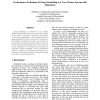Free Online Productivity Tools
i2Speak
i2Symbol
i2OCR
iTex2Img
iWeb2Print
iWeb2Shot
i2Type
iPdf2Split
iPdf2Merge
i2Bopomofo
i2Arabic
i2Style
i2Image
i2PDF
iLatex2Rtf
Sci2ools
IPPS
2009
IEEE
2009
IEEE
Performance evaluation of gang scheduling in a two-cluster system with migrations
Gang scheduling is considered to be a highly effective task scheduling policy for distributed systems. In this paper we present a migration scheme which reduces the fragmentation in the schedule caused by gang scheduled jobs which cannot start. Furthermore, the existence of high priority jobs in the workload is addressed by the proposed strategy. High priority jobs need to be started immediately, which can in turn lead to the interruption of a parallel job’s execution. A distributed system consisting of two homogeneous clusters is simulated to evaluate the performance. Our simulation results indicate that the proposed strategy can result in a performance boost.
Distributed And Parallel Computing | Distributed System | Effective Task Scheduling | Gang Scheduled Jobs | IPPS 2009 |
| Added | 24 May 2010 |
| Updated | 24 May 2010 |
| Type | Conference |
| Year | 2009 |
| Where | IPPS |
| Authors | Zafeirios C. Papazachos, Helen D. Karatza |
Comments (0)

